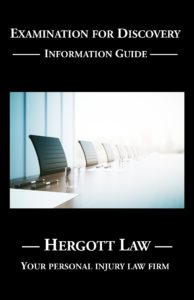![]() What is an examination for discovery?
What is an examination for discovery?
An examination for discovery (EFD) is a time set aside to allow the insurance company (through their lawyer) to ask you questions so they can learn about your claim.
You will be under oath, and everything you say will be recorded, word for word, by an official court reporter.
The setting is a boardroom table in an office. You are sitting at the table beside your lawyer, and the insurance company’s lawyer is sitting on the other side of the table.
![]() Are there any rules?
Are there any rules?
Yes, there are some rules. But you don’t have to remember them!
Regardless, here are they are:
- No Legal Advice – Your lawyer is not permitted to advise/coach you from the time the event starts through to the very end.
- Take Turns – Though unnatural, you must wait until the other person has completely stopped talking before responding. This is due to the Court Reporter having to transcribe the discussion.
- Use Words – Avoid things like pointing and gesturing, nodding or shaking your head, and uttering answers like “uh-huh.”
As I said, no need to remember them. And you won’t fail if you break them! Really, the only thing that matters is the Golden Rule: give honest answers to the questions asked.
Download Examination for Discovery Guide

![]() How do I prepare?
How do I prepare?
Your credibility will be tested by comparing the story you tell at your examination for discovery with the parts of your story that are told:
- In your medical records;
- In your employment records and income tax returns;
- In photos and videos (from home albums or social media);
- By others (witnesses); and
- In various ways in other types of documents.
You will best be able to avoid contradictions by refreshing your memory and being prepared to tell your complete story.
Will the insurance company lawyer try to trick me?
The Golden Rule (listen, think and give honest answers) should avoid any trickery that might come your way.
But really, insurance defence lawyers have a very small bag of tricks.
![]() What kinds of questions will I be asked?
What kinds of questions will I be asked?
Generally speaking, these are the types of things that are covered:
- What happened in the crash or collision;
- How you were in the months and years before the crash;
- Any medical care or therapies you might have accessed in the months and years before the crash;
- The onset and progression of any symptoms you think might have been caused by the crash;
- Any medical care or therapies you might have accessed since the crash;
- Your education and work history;
- Your work and work patterns after the crash;
- What activities you enjoyed and participated in during the months and years leading up to the crash, and how that changed after the crash;
- Your participation is household and yard chores in the months and years leading up to the crash;
- Any other injuries or events in your life that might have had an impact on your physical or psychological health; and
- Friends, acquaintances, work colleagues and supervisors and family members who might or might not have “witnessed” changes after the crash.
To learn more, take a look at the article below:

